
The newsletter of UCL Library Services - Issue 24: Spring term, 2010
Inside this issue
|
|
Here's this term's news from UCL Libraries.
If you are in the process of gathering together material for essays and dissertations etc. then please do come and ask for help at one of our Enquiry Desks. UCL Library Services sends all students very best wishes for the coming exam period.
|
|
Editorial board members:
Janet Cropper, Chris Carrington, Anne Chesher, Deborah Furness, Jason Hobart, Nova Larch, Grazia Manzotti, Martine Painter, Ruth Russell & Margaret Stone.
:: Contact the editorial board
|
What? Not online?
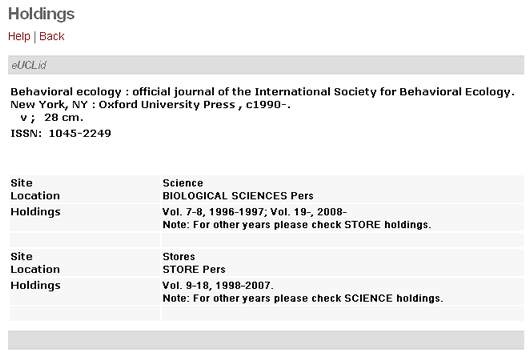 It seems that someone somewhere has told someone else and so on that everything is now available online so I'd like to take this opportunity to say that this isn't so. UCL Library Services provides access to thousands of electronic journals and hundreds of e-books, but sometimes you will come across material in the course of your research which either doesn't exist in digital format at this time or that we haven't been able to subscribe to yet.
It seems that someone somewhere has told someone else and so on that everything is now available online so I'd like to take this opportunity to say that this isn't so. UCL Library Services provides access to thousands of electronic journals and hundreds of e-books, but sometimes you will come across material in the course of your research which either doesn't exist in digital format at this time or that we haven't been able to subscribe to yet.
However, this doesn't mean that we don't have what you need as we have a lot of books and journals on the shelves in our libraries and a huge store outside London where we keep a lot of the printed matter that we've been collecting since the first Librarian was appointed in 1827 which is delivered to many of our libraries daily on request:
www.ucl.ac.uk/library/store.shtml
Our Catalogue has details of all that we hold and it links to electronic versions where possible with  so next time you are searching for a source then start here: so next time you are searching for a source then start here:
http://library.ucl.ac.uk
If you need help with resources and research then you can get it through various routes:
www.ucl.ac.uk/library/help.shtml
by Debs Furness
Innovators and Educators : UCL and Bloomsbury in the 19th Century
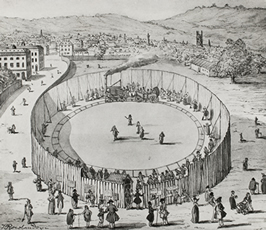
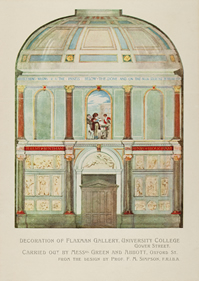 The new exhibition of material in the UCL Main Library from UCL Special Collections looks at some of the innovative institutions and individuals which flourished in and around UCL in the 19th Century. It has been inspired by and organized in conjunction with the Bloomsbury Project, led by Professor Rosemary Ashton of the English Department, which is undertaking wider research into the remarkable number of reforming institutions and people that congregated in the Bloomsbury area during the 19th Century.
The new exhibition of material in the UCL Main Library from UCL Special Collections looks at some of the innovative institutions and individuals which flourished in and around UCL in the 19th Century. It has been inspired by and organized in conjunction with the Bloomsbury Project, led by Professor Rosemary Ashton of the English Department, which is undertaking wider research into the remarkable number of reforming institutions and people that congregated in the Bloomsbury area during the 19th Century.
The exhibition focuses on individuals and institutions connected with UCL. There are papers from some of the early professors, including letters from John Elliotson, an innovative doctor and Professor of Medicine, who undertook controversial experiments with 'mesmerism' or hypnosis at University College Hospital (UCH) in the 1830s, as well as unexpectedly light-hearted cartoons and sketches by Augustus de Morgan, Professor of Mathematics here for over 30 years. There is material about some of the influential societies which used UCL as a meeting place, such as the Graphic Society, or which grew out of the activities of UCL staff and students, like the London Mathematical Society which was founded by UCL students in 1865. There are reproductions of paintings and life drawings from the Slade School of Fine Art, which was the first British art school to allow women to draw from a live model, as well as plans and photographs of the original buildings of both UCL and its counterpart on the other side of Gower Street, UCH. Finally, maps from the London History collection illustrate the growth and development of the area during the course of the 19th Century.
The exhibition runs from February until June 2010 and can be viewed in the display case on the stairs to the Main Library during regular opening hours.
by Martin Reid
Laurence Housman: Author and Activist
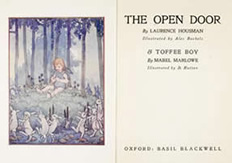 In 1978 UCL Library Services' Special Collections purchased the library of Ian Kenyur-Hodgkins (d. 1995), antiquarian bookseller: within this is the Laurence Housman collection which contains over 430 items written in English and published mainly in the 1920s and 1930s.
In 1978 UCL Library Services' Special Collections purchased the library of Ian Kenyur-Hodgkins (d. 1995), antiquarian bookseller: within this is the Laurence Housman collection which contains over 430 items written in English and published mainly in the 1920s and 1930s.
Laurence Housman (1865-1959), brother of poet and scholar A. E. Housman, was an extremely versatile artist, writer and social reformer whose output covered all kinds of literature from socialist and pacifist pamphlets to children's stories. His first works were fairy tales, legends and poems which he illustrated himself, but in 1900 he gained great popular success and some notoriety when he published anonymously An Englishwoman's love-letters. He then turned to playwriting, in which field he is perhaps best known, and his later plays featured public figures, heroes and role models. They included Little plays of St. Francis (1922), which gave a voice to his pacifist leanings, and Victoria Regina (1934), which was a biography of Queen Victoria and Prince Albert. Proceeds from productions at University College of The little plays of St. Francis supported the Franciscan Society (whose library is also deposited at Special Collections) in its early days.
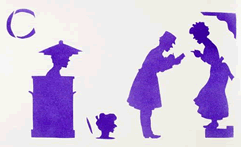 The author's depiction of biblical characters and members of the Royal Family were considered scandalous at the time and many of his plays had to be produced privately because of censorship. Victoria Regina, for instance, was performed with great success on Broadway before it was granted a licence in England in 1937 at the Lyric Theatre. A note of satire pervaded much of his writing in varying degrees.
The author's depiction of biblical characters and members of the Royal Family were considered scandalous at the time and many of his plays had to be produced privately because of censorship. Victoria Regina, for instance, was performed with great success on Broadway before it was granted a licence in England in 1937 at the Lyric Theatre. A note of satire pervaded much of his writing in varying degrees.
Housman's artistic fearlessness was echoed in his public commitment to underprivileged sections of society and to controversial campaigns. He supported the women's suffrage movement and was an indefatigable public speaker and writer of pamphlets and articles on women's issues. He was a member of the No Conscription Fellowship, formed to support those who objected to taking up arms in the First World War, and whose members later became known as 'conscientious objectors'. In 1919 he joined the Independent Labour Party and prison reform and international peace became pressing issues for him. He was also an active member of the British Society for the Study of Sex Psychology, which had as its aim sex education and promoting sexual freedoms, and in 1945 opened Housmans Bookshop in Shaftesbury Avenue, London (now located at 5 Caledonian Road) founded in his honour by the Peace Pledge Union, of which he was a sponsor.
This collection reflects Housman's prolific output and wide-ranging subject matter. It includes children's poems and stories, some of which are illustrated by Housman; works that reflect his Suffragette and pacifist sympathies including the rare An anti-suffrage alphabet (1911); articles, reviews and lectures on religion, justice, social subjects and literature; and numerous contributions to the journal The album: a journal of photographs of men, women and events of the day in 1895 under the rubric The world of art or Our art supplement. As well as containing contributions by Housman The album... is a vivid snapshot of late 19th century life with colourful pictorial covers, numerous photographs of well-known contemporary politicians, actors, musicians, sportspeople and authors, and articles on travel, gardening, animals, fashion, sport, music and home improvement. In the 1920s and 1930s he regularly contributed poems, stories and articles on religious matters to St Martin's review, the church magazine of St. Martin's-in-the-Fields, Trafalgar Square, a church known for playing an active role in wider social, humanitarian and international issues.
Also present is Housman's autobiography, The unexpected years (1937), as well as a tribute to his brother, A.E.H.: some poems, some letters and a personal memoir by his brother (1937).
Many of these works are first editions and contain Housman's own inscriptions.
by Kylia Eastwell
Economists Online launches at Subject Repositories conference
 Economists Online, a new economics subject repository, was officially launched on 28th January at the British Library Conference Centre. This service has been developed by Nereus, the international consortium of academic research libraries with strengths in economics, and co-funded by the European Commission's eContentplus programme. The project has taken an international, subject-orientated approach which can act as a model for others to follow by setting standards, guaranteeing the quality of information and providing strong branding.
Economists Online, a new economics subject repository, was officially launched on 28th January at the British Library Conference Centre. This service has been developed by Nereus, the international consortium of academic research libraries with strengths in economics, and co-funded by the European Commission's eContentplus programme. The project has taken an international, subject-orientated approach which can act as a model for others to follow by setting standards, guaranteeing the quality of information and providing strong branding.
Economists in participating institutions, including UCL, have been encouraged to deposit open access copies of their publications in their local institutional repository; Economists Online - a cross-searchable, multilingual portal - then picks up or "harvests" this material, making it freely available. The portal provides individual profiles and complete publication lists of scholars, faceted search technology, downloadable primary data sets and rich bibliographic information, with abstracts, JEL codes and Open URL links.
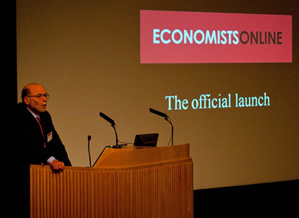 Professor Barr launches Economists Online
Professor Barr launches Economists Online
Attended by librarians, IT specialists, publishers and economists from 23 countries, the 2-day Subject Repositories conference (the organisation of which fell into the author's work package) allowed Nereus members to showcase the service in both plenary and parallel sessions, sharing lessons learned and engaging with delegates in discussions on core themes such as infrastructure and interoperability, content recruitment, multilingual tools, data sets, usage statistics and intellectual property rights. The latter workshop was facilitated by Martin Reid, Academic Support Manager for Social Sciences within UCL Library Services. The programme also placed subject repositories in the wider context, with delegates hearing about repository trends across 3 continents.
Particular highlights included Dr. Clifford Lynch, the Director of the Coalition for Networked Information (CNI), "speculating irresponsibly" [his words] and Hans Geleijnse, the Director of Economists Online, surveying the landscape of existing subject repositories in Europe. Themes which came up repeatedly during the conference included the importance of sustainability, the need for a critical mass of content, visibility as a key to success and how subject repositories can provide tailored services for specific disciplines.
Before launching Economists Online, Professor Nick Barr from the London School of Economics shared his thoughts and observations about the changing nature of scholarly communication in economics. An experienced and learned economist in the 1950s could claim justifiably to know the whole of the subject; now no one academic could lay such a claim. With the overwhelming volume of journals, working papers, conference proceedings and data now littering the Web, Economists Online is part of the solution to combating such information overload. Prof. Barr challenged the audience to create search systems which would respond to a search query of "articles that interest me"!
Dr. Paul Ayris, Director of UCL Library Services, delivered the closing address where he set out the environment in which a researcher works, namely, a world comprising of a variety of systems, both local to an institution and global, with a range of sources and materials from the traditional to the cutting edge. Dr. Ayris considered what a third generation subject repository might look like incorporating e-Press functions, the need for open access to be embedded at the institutional level and the importance of strategic partnerships.

 Collaboration emerged as a key factor in the success of new infrastructure to deal with electronic research, in its various forms. Time will tell if the model for Economists Online as a superstructure on top of institutional repositories is a sustainable one. However, the delegates of this conference were left in no doubt about the degree of planning, strategic thought and hard work that has gone into the development of this new portal.
Collaboration emerged as a key factor in the success of new infrastructure to deal with electronic research, in its various forms. Time will tell if the model for Economists Online as a superstructure on top of institutional repositories is a sustainable one. However, the delegates of this conference were left in no doubt about the degree of planning, strategic thought and hard work that has gone into the development of this new portal.
by Kieron Jones
Profile - Susan Stead, Rare Books Librarian
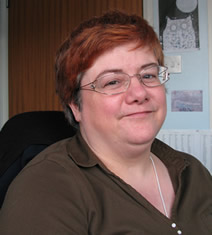 I came to UCL in February 1988 as Deputy Head of the Periodicals Section in the Library. I had just finished a year's postgraduate study of history at Cambridge and had no clear plans for my future. At UCL I was given the opportunity to study for a Diploma in Librarianship. I studied part-time while making up the hours.
I came to UCL in February 1988 as Deputy Head of the Periodicals Section in the Library. I had just finished a year's postgraduate study of history at Cambridge and had no clear plans for my future. At UCL I was given the opportunity to study for a Diploma in Librarianship. I studied part-time while making up the hours.
In 1990 a vacancy arose in what was then called Manuscripts and Rare Books. At that time there were only two full-time staff and a part-time assistant. I was already interested in printing history from my own research and soon fell in love with the rare books. Over the years we gained more staff and changed our name to Special Collections. Then in 2002 we moved away from the main site to 140 Hampstead Road. We now have five full-time staff, plus a part-time shelver, and two cataloguers and a Preservation Librarian working on site.
I regard myself as very lucky to work with such wonderful collections. I am responsible for the cataloguing, and arrangement of the books housed in Special Collections. My job also includes the promotion of our rare printed collections. I learn new things all the time and find new treasures constantly. Some finds are quite humble, a family Bible with records of important family events perhaps, or truly newsworthy, such as the rediscovery of a Byron poem in his own hand.
I particularly enjoy cataloguing and teaching. This last activity has become increasingly important over the last few years. We host classes in Special Collections using our early printed books, archives and medieval manuscripts and encourage students and academic staff to use this material in their teaching, study and research. We also take material out for lectures and displays and are currently embarking on new Public Engagement programmes.
I remain fascinated and enthused by rare books and my mission is to pass on this passion and knowledge. Books are an important part of our cultural and intellectual heritage and I have found very few people over the years who are not enraptured by them.
by Susan Stead
Spotlight on... UCL Bartlett Built Environment Library
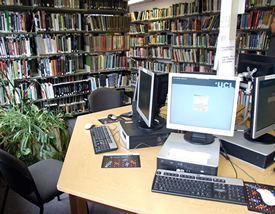 Environmental Studies, ES, Architecture Library, Bartlett, Wates House Library, Llewelyn Davis Library, Planning Library... the library on the fifth floor of Wates House has been known by all these official and not-so-official names over the years. So in order to remove some of the confusion and also to clarify its subject focus, the library was formally re-named as the UCL Bartlett Built Environment Library at the beginning of this academic year.
Environmental Studies, ES, Architecture Library, Bartlett, Wates House Library, Llewelyn Davis Library, Planning Library... the library on the fifth floor of Wates House has been known by all these official and not-so-official names over the years. So in order to remove some of the confusion and also to clarify its subject focus, the library was formally re-named as the UCL Bartlett Built Environment Library at the beginning of this academic year.
Although UCL's built environment library came into being when Wates House opened in 1974, its origins lie in two smaller libraries which served the separate departments of Architecture and Town Planning. When the Faculty of Environmental Studies was created in the early 1970s, the libraries were subsequently merged and the resulting Environmental Studies Library occupied the top floor of the building, where it still is today. The view from the library has changed a little over the last 35 years, with taller buildings along Euston Road and taller trees on Endsleigh Gardens, but it is still possible to look up from the page and relax the eyes on the green view north to Hampstead and Highgate – the original motivation for placing the library at the top of the building.
The Library holds materials on all aspects of the built environment and has around 50,000 books and 250 current journal subscriptions. UCL is the only institution within the University of London with a department devoted to the study and design of the built world, hence the collections within the Bartlett Library are unique in this context. The interdisciplinary nature of studies in the Faculty means that the two distinct but complementary Town Planning and Architecture collections are wide-ranging and cover subjects as diverse as architectural history, environmental design, development planning, construction management, transport planning and housing studies. Although much material is available online, the Architecture collection in particular still relies heavily on printed monographs and journals. Of particular note are strong collections of material relating to twentieth century architects and to London and the South-east. Students' past work is also represented by a heavily-used collection of MSc dissertations.
The library also holds an expanding collection of DVDs related to urban matters. This ranges from feature films and documentaries to DVDs of the Bartlett's various lecture series. Most are available to borrow but there are also viewing facilities in the library itself.
In addition the library has a workstation providing access to web-based resources such as the RIBA catalogue and three cluster PCs giving access to all Library Services' internet resources. The library is also RoamNet enabled allowing registered users wireless access to the UCL network. Visitors to UCL may also access licenced electronic resources from a dedicated workstation.
Bartlett Library staff also offer a range of information skills training events to members of the Faculty, from general literature searching sessions to more focused sessions on individual databases. Library staff are happy to see groups or individuals, so if you are a member of staff or a student at the Bartlett and require help with your research, please contact Suzanne and Caroline at the addresses below.
by Caroline Fletcher & Suzanne Tonkin
Knovel Prizewinner
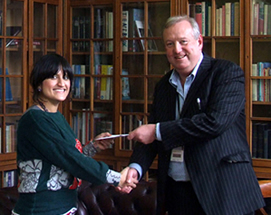 Congratulations go to Sandra Guzman-Rodriguez from Civil, Environmental and Geomatic Engineering who won a $50 gift card in the Knovel University Challenge. Knovel is a provider of online database and ebook resources containing full-text science and engineering publications and including tables, graphs and equations which can be manipulated and exported. It can be found in our list of databases.
Congratulations go to Sandra Guzman-Rodriguez from Civil, Environmental and Geomatic Engineering who won a $50 gift card in the Knovel University Challenge. Knovel is a provider of online database and ebook resources containing full-text science and engineering publications and including tables, graphs and equations which can be manipulated and exported. It can be found in our list of databases.
The Knovel University Challenge requires students to use Knovel to correctly answer three engineering questions across multiple disciplines in order to be entered into a prize draw. This year's questions were difficult, yet more than 2,200 students from around the world participated in the challenge. The Knovel University Challenge takes place every year between October and December. This was the first year that UCL took part and we are looking forward to doing it again next year.
We would like to thank everyone who participated.
by Lynne Meehan
 Top of page Top of page
Issue 24 - Spring term, 2010
|

